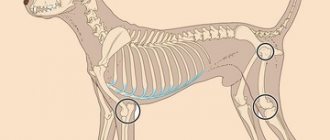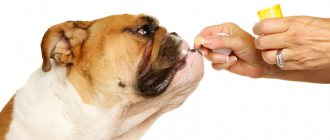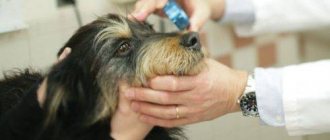General information
The procedure for registering dogs for competitions held by the Russian Cynological Federation is established in the “Regulations”. The document contains the following standards:
- application deadlines;
- required list of documents;
- procedure for paying the registration fee;
- registration of the catalog of exhibition participants of various ranks.
The registration procedure and timing depend on the level of the exhibition. Only accredited organizations can hold competitions. So, at the beginning of the year, when the exhibition plan is being drawn up, cynological organizations can declare their desire to act as an organizer of events at various levels:
- rank CACIB (international (all-breed) exhibition);
- CAC rank (national competition), which determine the following winners:
- RKF champion;
- Federation champion;
- candidate for Federation champion.
In addition, there are exhibitions:
- monobreed;
- all-breed, where representatives of different breeds participate.
At specialty shows, winners are awarded the following titles:
- Club Champion – awarded at annual national exhibitions;
- club winner - interregional exhibitions are held for this purpose;
- candidate for club champion - determined at regional competitions.
Dog show of all breeds, CAC rank, Moscow NEW YEAR'S MOOD
RULES FOR REGISTRATION OF DOGS FOR THE SHOW PLEASE ! BEFORE REGISTERING YOUR DOG FOR THE SHOW, PLEASE READ THESE RULES IN DETAIL!
Registration of dogs for participation in the exhibition is carried out upon provision of the following package of documents: - A completed application form for one dog, signed by the owner (or an application through the zooportal.pro system) - a copy of the dog's pedigree or a copy of the puppy's metrics (only for baby, puppy, junior classes) . — a copy of the receipt for payment of the participant’s voluntary target contribution — copies of international working certificates and champion certificates when registering for the working class and the champion class. Attention! Without providing the above certificates, registration for the exhibition will be in the open class. Registration for International Shows in classes in which CACIB is awarded - intermediate, open, working, champions, must be carried out only on the export pedigree “EXPORT PEDIGREE” or on the pedigree in one of the FCI languages “PEDIGREE”. The applicant is responsible for the correctness of the information provided about the dog. Corrections and additions to the application form are not allowed. The transfer of a dog from class to class is allowed only at specialized (single-breed) exhibitions in the event of receiving a Champion title or an International Certificate of Performance before the end of registration upon the personal application of its owner with the provision of a receipt for payment of the voluntary target contribution of the participant on the date of transfer of the dog from class to class .
Attention! When registering a dog for an exhibition: - all scans of documents must be sent only in JPG or PDF format; — when registering two or more dogs, all documents must be sent for each dog in a separate letter (each separate application through the zooportal.pro system); — registration of a dog is carried out only upon receipt of a complete package of scanned documents with a scanned copy of the receipt for payment of the voluntary target fee attached in compliance with the deadlines for its payment (No later than the last day of the established period); — please indicate valid contact numbers in the application form! If the owners of the dogs do not provide the specified documents, or if the documents are provided in violation of the established deadlines, the dogs will not be registered for participation in the exhibition.
To correctly enter information about a dog into the Exhibition Catalogue, when filling out a receipt or payment order for payment of a voluntary target contribution for the organization and holding of an exhibition, you must indicate: - the name of the exhibition; - breed of dog; - the dog's name; - Class; - Full name of the dog owner. Please attach receipts for payment of the fee to your application.
ATTENTION! The target fee is not returned to the dog owner (except for the death of the dog, confirmed by a certificate issued by the state veterinary clinic, if the certificate is provided to the exhibition organizing committee before the end of registration).
Each participant must have a VETERINARY PASSPORT with marks from the state veterinary clinic on vaccination against rabies. When receiving accompanying documents F-1 and F-4 for participation in a dog show, you may need to name the site in the Mercury system, the enterprise number in the register and the enterprise number in the Cerberus IS.
— Check with the organizer for requirements. If there are no veterinary documents, the veterinary control officer has every right not to allow your dog to participate in the exhibition.
Where to begin
Anyone can participate in exhibitions with their purebred dog. You can find out the schedule of events on our website, as well as get reliable information from the kennel clubs of your city. They can also help with registration for the exhibition.
But before this, you should undergo a preventive examination by a veterinarian and vaccination. A veterinary passport, and in some cases a veterinary certificate, will be required directly at the exhibition, but you need to make sure your pet is in excellent health and get the necessary vaccinations in advance.
Comprehensive vaccination and rabies vaccination are mandatory: it is valid for 1 year, and the vaccination should be given no later than a month before the planned exhibition. Veterinary control is especially strict about animals coming to competitions from other regions. To travel outside your region, you should obtain veterinary certificate No. 1 from your doctor the day before.
How to prepare a dog for a show?
You need to think about how and why to prepare your pet for an exhibition from an early puppy age.
An exhibition is a kind of competition with its own strict rules, which means your pet will be judged on certain qualities. The first is appearance. Not only the exterior and compliance with standards are important here, but also the neatness of the animal. The second is presentation. The animal must demonstrate the ability to behave in public. It is these two parameters that you will have to work on from the very moment the puppy arrives at your home. You need to find out the appearance standards for your dog’s breed, learn how to maintain your pet’s neat appearance on your own, and, if necessary, find a professional groomer. It is important to remember that the appearance of the future champion very much depends on the diet. High-quality, balanced nutrition from the first months of life is something that deserves special attention. You should also additionally focus on the condition of the coat and skin. There are special complete animal feeds that improve coat quality, for example, the Purina® Pro Plan® line with OptiDerma® complex.
Education and psychological training occupy a separate place in preparation. From a very early age, it is necessary to begin to accustom the puppy to the basic commands: “come to me”, “near”, “sit”, “stand”, “lie down”, “fu”, etc. The best way to teach your baby commands is to turn learning into a game. This way the dog will happily complete the assigned tasks without expecting additional incentives. It is under no circumstances recommended to punish your pet during training. As soon as the quarantine ends after vaccinations, it is necessary to begin socialization of the animal. Spend as much time in the fresh air as possible, communicate with other dogs, go out into crowded places, travel on public transport - all this will greatly help the animal not to get lost and remain calm in the crowd.
In order to finally train your dog before the ring, it is best to contact a professional. A handler is a person who will teach your dog to move around the ring correctly, stand in a stance, select the necessary accessories, and hone the nuances of training. As a rule, handlers specialize in one or two breeds of dogs and know very well all the features of their exhibitions.
Dog registration procedure
You need to register for the exhibition in advance: as a rule, 10-14 days before the event, registration ends for the CAC rank; registration for the CACIB rank exhibition ends even earlier - 30 days before the event. When finding out when and where the exhibition will take place, it is better to immediately clarify the list of required documents and select the class in which the pet will be registered.
Important!
After registration, transfer to another class is not permitted.
Each organizer has its own registration rules and requirements for submitting documents. However, there are also general provisions. So, in addition to filling out the application, the owner submits:
- a copy of the pedigree (puppy card - puppies under 15 months);
- a copy of the document confirming payment of the organizational fee for participation in the exhibition.
The payment procedure and the amount of the registration fee are established by the organizers of the event, who must:
- be registered as a legal entity;
- have an open bank account;
- timely transfer payment for the event to the RKF bank account.
Application form
An application for a pet to participate in an exhibition is made by its owner. It must indicate:
- breed and name of the dog, show class;
- Date of Birth;
- gender and color;
- pedigree data;
- stamp data;
- nicknames of the parents of the dog participating in the exhibition;
- details of the breeder and owner of the animal (indicating home address, contact telephone number).
All data is filled in by the applicant independently. By signing the application form, the owner is responsible for everything contained in it.
Important!
Registration for some exhibitions is possible online. You should check with the event organizers about this possibility.
Pedigree
Only purebred animals are allowed to compete. In addition, the RKF without restrictions recognizes the pedigrees of member countries of the FCI (Federation Cynologique Internationale), as well as the American, Canadian and English Kennel Clubs. Animals with the export pedigree “Export Pedigree” are allowed to participate in international exhibitions of the CACIB rank.
Important!
When planning to participate in major international dog shows and foreign competitions, you should obtain a breeding certificate (export pedigree) of the established form in advance. Issues an RKF document instead of a regular pedigree.
Selecting an exhibition class
According to the general rules, all registered animals can compete in one of the following classes:
- Baby (for puppies from 3 to 6 months);
- Puppy (6-9 months);
- Junior – from 9 to 18 months;
- Open (open class).
In addition, there is a Working class for service and sporting animals. If a dog already has titles and awards, it can participate in competitions in the Champion class. For animals over 8 years old, the Veteran class is provided.
Important!
To enroll in the worker and champion classes, you must provide supporting certificates issued by the FCI or RKF.
Not all shows involve puppies younger than six months of age. The organizers decide on the participation of Baby class puppies in competitions independently. The age of the animals is determined on the day preceding the exhibition. In case of discrepancy between the data specified in the pedigree and the entry form, the dog may be removed from the competition.
In the event of the death of an animal during the period between submitting an application for participation and the exhibition, the owner is obliged to inform the organizer of the event about this, attaching the original certificate issued by the veterinary clinic. If registration for the exhibition has not yet been completed, the owner will be refunded the amount of the registration fee paid.
Veterinary documents
Having a veterinary passport with notes on mandatory rabies vaccination is another important condition for every four-legged participant in the competition. In some cases, exhibition organizers require a veterinary certificate about the health of the animal.
The need for it must be clarified in advance, since veterinary control employees on the day of the competition have the right to not allow the participant to enter the ring. The organizers do not bear any responsibility if the dog is disqualified.
Disqualification
Except in cases where a dog was removed from the competition due to lack of veterinary documents, the organizers have the right not to allow it to participate in the exhibition if the animal was previously disqualified.
Judges can disqualify a dog for its appearance or behavior uncharacteristic of the breed. Organizers are required to report the reason for awarding the white ribbon to the RKF. The Federation publishes the protocol on the website. The organizers are responsible for the admission of a disqualified dog to further exhibitions.
What do you need for a dog show?
Are you the owner of a purebred dog and would like to take part in an exhibition so that your pet can become a title holder or receive an assessment for admission to breeding? It is often difficult for beginners to navigate the abundance of information. In this article we will try to tell you what is needed for a dog show.
The first thing you need to know is that dogs of any age can take part in the exhibition. Existing exhibition classes allow participation from puppies over 3 months of age and veterans over 8 years of age.
Find out what exhibitions are being held in your city in the near future. Usually, when registering in advance, owners pay 1000-2000 rubles, so it is better to find out the deadline for submitting an application in advance. To register for the exhibition, you will need to provide documents: a copy of the pedigree or puppy card; in some cases, training diplomas are required. Also, on the day of the exhibition, when registering, you may need a veterinary passport and an F1 certificate.
People usually arrive at the exhibition in advance - at least an hour before the start of the ring. According to the show regulations, the expert will examine and describe the dog while standing. The judge must examine the dog's bite and teeth, as well as other parts of the dog's body. Then you have to show the dog in motion. Small breed dogs should be trained in advance to display on the table. If you are afraid that you will not be able to cope on your own, you can contact the handler (the person who demonstrates the dog at the exhibition). His services may be free or may be expensive depending on the level of the handler.
It is necessary to take a clean bowl and water with you to the exhibition, prepare a bag for the treat and the treat itself. You may need tools such as a comb and cosmetics to make your dog look more impressive at the competition. It may be worth bringing things that your dog is used to - this will help reduce stress levels.
Why do you need to go to dog shows? For dogs going for breeding, an assessment from the exhibition is required when registering the litter, otherwise the puppies will be left without documents. It is better, of course, to close the titles, since this reflects the quality of the breed animal. In addition, many participate in exhibitions for pleasure - owners and dogs really like the atmosphere there.
If you want to prepare your dog for a show - bring it into excellent physical shape, teach it the necessary skills - the instructors of our center will be happy to help you.
SERVICES FOR DOGS AND THEIR OWNERS
When registering a dog for an exhibition, the owner must provide: – a completed application (or online application) containing the dog’s name, abbreviation and pedigree number, brand/microchip number, date of birth, color, father’s name, mother’s name, full name. breeder, full name owner indicating the city/country of residence, telephone number and e-mail of the owner, exhibition class in which the dog is registered; – a copy of the pedigree (entry into baby, puppy, and junior classes is possible based on the puppy’s metric); – a copy of the championship or work certificate (if applicable); – a copy of the receipt for payment of the target contribution.
By sending the application form to the exhibition organizing committee, the owner agrees to the processing, storage and publication of his personal data in the catalog and reports.
At RKF exhibitions, dogs can be enrolled in the following classes: – baby class – from 3 to 6 months. (optional, at the discretion of the organizers); – puppy class – from 6 to 9 months; – junior class – from 9 to 18 months; – intermediate class – from 15 to 24 months; – open class / open class – from 15 months; – working class / working class – from 15 months. on the basis of a working certificate for a specialized type of test (when registering for exhibitions of the CACIB rank, only international certificates are taken into account); – champion class – from 15 months. based on a certificate / diploma of a champion of any FCI country, as well as KC, AKC, CKC, FCI International Beauty Champion (CIB) or FCI International Show Champion (CIE); – NKP champion class / club champion class – from 15 months. on the basis of a certificate/diploma of the National Club Champion (only at single-breed shows for breeds that have a National Club Club); – veteran class – from 8 years old.
The date for determining the dog's age is the day of the exhibition. If the dog's birthday coincides with the date of the exhibition, then the owner has the right to independently decide in which class to register the dog.
Transfer from class to class after registration for the exhibition is not allowed. Replacing a dog in the catalog is possible before the end of registration for medical reasons (subject to a certificate from a veterinarian).
The target fee is refunded only in the event of the death of the dog (according to a certificate from a veterinarian provided before the end of registration) or in the event of cancellation of the exhibition due to the fault of the organizer. In the event of cancellation of the exhibition due to force majeure circumstances, the possibility of returning the actually paid target fees or part thereof is determined by the organizer.











